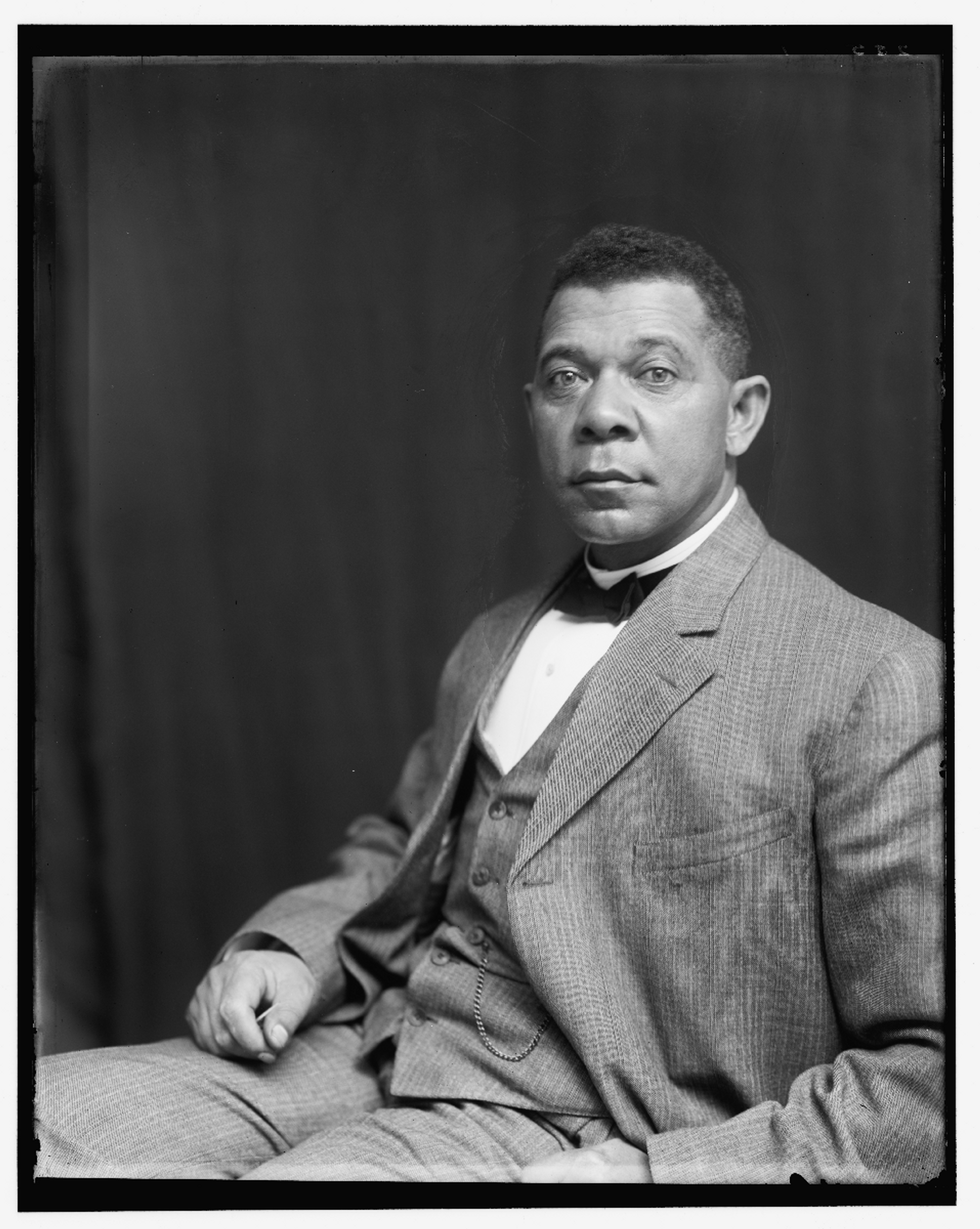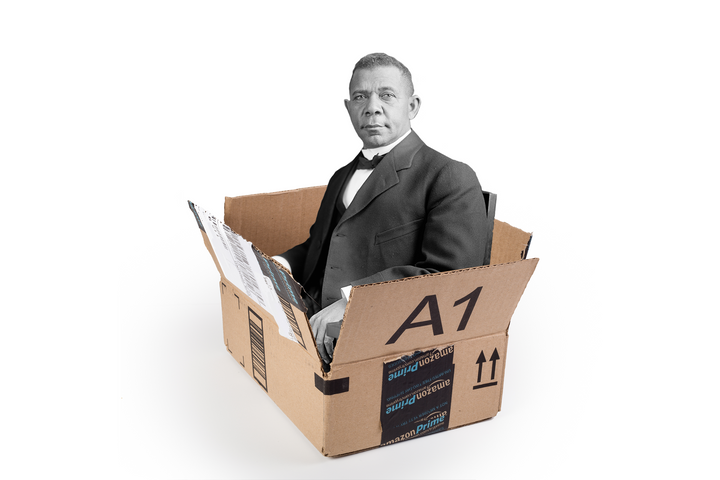Winter 2016
Reconsidering Booker T. Washington in the age of Amazon
– Jonathan Malesic
Though long dismissed as a proponent of respectability politics, Washington's ideas about work and dignity merit serious thought in the era of the 24-hour workday.
At the time of his death on November 14, 1915, Booker T. Washington was an international figure, both renowned and reviled for his ceaseless efforts to promote industrial education as the path to economic — and ultimately civic — prosperity for the children and grandchildren of enslaved African American laborers. In a memorial service for Washington the Sunday after his death, the Jewish philanthropist Jacob Schiff eulogized Washington as a Moses figure, one who did not reach the promised land of racial equality, but who “showed the way” there. “As the decades and the centuries roll by,” Schiff said, “he will rise higher and higher in the memory of his race and of all mankind.”
A century later, we know that Schiff’s prediction was wrong. Although Washington had considerable appeal during his lifetime, his focus on technical skill ahead of liberal education, and economic opportunity ahead of political rights, drew criticism from W. E. B. Du Bois, the newly formed National Association for the Advancement of Colored People, and others. Du Bois argued in his 1903 book The Souls of Black Folk that Washington’s strategy would keep African Americans docile workers, stunt their intellectual and cultural development, and do nothing to upend white supremacy. By the era of the civil rights struggle, Du Bois’s vision had prevailed, including among white intellectuals and activists. Since then, Du Bois’s criticism of Washington has become standard; in today’s academy, Washington receives far less attention than Du Bois and is often dismissed as a proponent of respectability politics.

Nevertheless, Washington is worth taking seriously again as a thinker. In saying so, I follow a handful of scholars — including Curtis Evans, Wilson Jeremiah Moses, David Sehat, and the author of a 2009 biography of Washington, Robert J. Norrell — who have recently delved into Washington’s life, work, and context and found a more sympathetic, conflicted, intelligent, and religious figure than Du Bois allowed. As the historian Pero Gaglo Dagbovie has said, Washington should be studied “as a political theorist and perhaps even a philosopher.” Booker T. Washington has something to offer academics and activists who are concerned with the ethical and political problems surrounding dignity and labor. His thought can help our efforts to understand the value of work in a social context — like his and like ours — in which the worker’s personhood is often in question.
As a white academic, I hesitate to recommend a figure who for decades has been viewed as a traitor to African Americans. To be clear, I am not recommending that we pursue racial justice by following Washington’s program. Treating Washington seriously as an intellectual would mean setting aside the matter of whether or not he has the right answers to problems of racial justice, and instead seeing him as someone whose effort to find answers to questions about the worker’s role in society — even a fitful, frustrated, and self-contradictory effort — can illuminate efforts to do the same today. If we look to Washington again as a thinker and not only as a figure with troubling racial politics, we might find that even those of us with different politics do share some of his thoughts — and some of the flaws in his thinking.
Washington believed that people could find dignity in work — a widespread belief today. But how does work offer dignity to the worker?
The basis for Washington’s entire outlook is the idea that people can find dignity in work. There is nothing controversial about that idea today. Although there was still an enviable leisure class in Washington’s lifetime, today’s One Percent flaunt their tireless work, not their idleness. The moral value of work is so ingrained in the American mind today that no politician would dare question it.
But how does work offer dignity to the worker? Washington’s answer both reflects a common view today and leads directly to the problems that Du Bois and later critics find in Washington. On Washington’s account, dignity is not inherent in the mental or physical activity that comprises our work; it is conferred on the person by those in the community who benefit from the work. He believed that that was possible because “there is something in human nature which always makes an individual recognize and reward merit, no matter under what colour of skin merit is found.” Washington tested this principle in the industrial trades programs, such as brickmaking, that he established at the Tuskegee Institute, which he founded. In his best-known book, Up from Slavery, published in 1901, Washington reports that white residents of the region recognized the quality of the bricks his students made and sought to buy them. Racial tension was eased, Washington says, by the fair commerce between these black artisans and their white clients. In these exchanges, the school made money, its white neighbors got good bricks, and the students earned “the independence and self-reliance which the ability to do something which the world wants done brings.”
There is a contradiction in this claim, though, that reveals the ultimately tragic character of Washington’s thinking about dignity: If your reward comes from doing something that others want done, then you are not really self-reliant. What happens to your dignity once the world no longer wants done what you can do? This is exactly the question faced by millions of workers — factory laborers, waiters and waitresses, even anesthesiologists — whose jobs are being automated, or those, like cabdrivers, who are being replaced by “cloud” labor.

Unless you can be confident in your continued employment and in the willingness of others to recognize your merits, it is risky to depend on work as your source of dignity. Washington claimed that “the whole future of the Negro rested largely upon the question as to whether or not he should make himself, through his skill, intelligence, and character, of such undeniable value to the community in which he lived that the community could not dispense with his presence.” In Washington’s context, and despite his repeated claims to the contrary in Up from Slavery, African American workers could not rely on communal recognition of their ability; in fact, Jim Crow kept them from good opportunities to exhibit their skill. Today, few American workers face the constant threat of violence that southern blacks did, but business doctrines discouraging long-term commitment to employees ensure that no worker is indispensable. Workers in high-prestige industries like finance and technology often embrace the precarious nature of their employment; they put in 80-hour weeks in order to demonstrate their “talent,” perhaps to themselves first of all, and bouncing back quickly from a layoff is to them confirmation of their ability. But these workers are unusual; most people value stable employment.
Unless you can be confident in your continued employment — and in the willingness of others to recognize your merits — it is risky to depend on work as your source of dignity.
Even if a worker really is meeting others’ needs, perpetually striving to meet them and thereby attain dignity will ultimately cause the worker physical and mental harm. On Washington’s model, the pursuit of dignity has paradoxical results; relentlessly working to win others’ approval — or even simply a fair wage — can grind the person down.
Amazon’s workers offer a sobering example. From warehouse pickers to software engineers, they all contribute to the effort to “do something which the world wants done”: sell and deliver any product cheaply and conveniently. But because the world wants it done faster and faster, these workers are expected put in long hours and are subjected to withering performance evaluations, as a New York Times exposé of Amazon’s Seattle headquarters showed in August. Internal lingo calls Amazon’s white-collar employees “Amabots,” though to the rest of Seattle, they’re “Amholes.” Whichever way you look at it, though, their work has damaged their human dignity — and these are the best-paid workers in the most prestigious positions in the company. At the other end of Amazon’s wage spectrum, the assault on dignity is more immediate and bodily; a previous exposé by the Allentown Morning Call showed that ever-escalating productivity quotas and heat exhaustion were common at an Amazon distribution center in Pennsylvania.
.png)
Were he alive today, Washington might applaud the Amazon ethos of total devotion to work. His ideal is the worker who “loses himself,” or who “completely obliterates himself” in the work. In praising those who pour themselves into their projects, Washington uses language that the New Testament applies to the self-sacrifice of Jesus Christ. Of Dr. Hollis Frissell, the white principal of the Hampton Institute in Virginia, Washington writes that his “constant effort” was “to make himself ‘of no reputation’ for the sake of the cause” of African Americans’ education. This language is borrowed from Philippians 2:7, where Paul describes Jesus’s kenosis, his action of “empt[ying] himself, taking the form of a slave.”
It’s bad enough for an employer to expect a software engineer to give all of her time and effort to her work; at least, in addition to the promise of dignity, she’s earning a good wage. It’s a far worse abuse of the language of dignity to expect a poorly paid, harried temp running through a warehouse — or, in the case of Washington’s earliest students, a worker who had already been a slave — to exhibit Christ-like levels of self-sacrifice for the sake of someone else’s profit. This is the tragedy of seeking dignity through recognition for your work. Unless your community is already disposed to recognize you, then you may lose not only your dignity, but much more besides.
This is the tragedy of seeking dignity through recognition for your work. Unless your community is already disposed to recognize you, Christ-like levels of sacrifice for someone else’s profit may cost you not only your dignity, but much more.
Washington’s faith in the “universal law” that people are inclined to reward merit makes him seem optimistic to the point of obtuseness, but there is more to the story. Washington was intellectually conflicted and politically savvy, delivering different messages to different audiences. A complete accounting of his thought must include a vision that is rather less confident in the law of merit. He shared this vision not with the American public, but with his students in speeches he delivered at Tuskegee on Sunday evenings. While the theology of Up from Slavery appears mostly in oblique references, Washington makes more explicit religious appeals in these speeches, quoting scripture frequently. One of Washington’s favorite Bible verses is Revelation 3:5, which he quotes as, “He that overcometh shall be clothed in white raiment,” placing the reward for overcoming struggles into a world beyond this one.
Washington had an ambivalent and strained relationship with African American Christianity, frequently criticizing what he saw as its emphasis on otherworldly hope. If one can attain an eternal reward through mere belief, Washington thought, then why bother working hard in this life? And yet Washington knew that earthly rewards were often deferred, and he relied on prophecies of a new heaven and a new earth to bolster his students’ faith in the law of merit. Even in Up from Slavery, written for a white audience of potential benefactors, Washington qualifies this faith, saying that merit will be rewarded “in the end” or “in the long run,” raising the inevitable question of how long a worker should wait for it. Should they hold out for the end times? Despite Washington’s avowed faith in the American capitalist creed, his ambivalent eschatology reflects Marx’s claim that “Religious suffering is, at one and the same time, the expression of real suffering and a protest against real suffering. Religion is the sigh of the oppressed creature, the heart of a heartless world, and the soul of soulless conditions. It is the opium of the people.” To imagine that the reward for your merit will be realized in a next world is, all at once, to acknowledge that it really should be rewarded now, to mitigate the sting of it not being rewarded, and to affirm that it will be rewarded one day. Looking ahead to the eschaton is both an effort to convince oneself of one’s ideals and a genuine expression of hope in a new reality.
In this world, doing a good job is often not enough to secure your employment or your dignity.
In this world, doing a good job is often not enough to secure your employment or your dignity. Academics have rejected Washington, but how many of us, and how many of our students, believe the exact same thing he did? Scholars like me tell ourselves that the academy rewards merit; after all, we have blind peer review and systems of citation to assign each other status. But the system is, in fact, grossly unfair. Many thousands of good scholars and teachers labor in obscurity, if not poverty. Contingent faculty members feel stuck in a vicious cycle; they cannot win a research grant or a book contract without a prestigious tenure-track position, but they cannot get that position without a research grant or a book contract.
When I teach Up from Slavery, my (mostly white) undergraduate students are drawn to Washington’s vision of work. Most of them are from the working class and aspire to a secure position in the professions, and they see the value they place on hard work reflected in Washington’s words. This is what worries me. I’m concerned that my students believe the American myth that Washington espoused and I wish were true, and that they will end up toiling for an insufficient reward, always hoping that things will break their way eventually, while their more privileged peers, whose dignity was never in question, prosper without having to crucify themselves.
No thinker should be considered totally apart from his context, especially the context of the debates he was drawn into. And so we cannot pretend that Washington was actually a James Baldwin or Martin Luther King Jr. But good thinkers from the past never only focused on the one thing their best critics pointed out as a blind spot. With a century’s distance, scholars should see that Washington was, as we are, thinking through questions concerning labor as a moral and even spiritual struggle. Like he did, we have complex but unsatisfactory answers. If we want better ones, then contending with Washington’s thought — which mirrors our own perhaps more than we would like to admit — can only help.
* * *
Jonathan Malesic is associate professor of theology at King’s College in Wilkes-Barre, Pennsylvania. He is writing a book on the ethics and spirituality of work. Find him on Twitter at @jonmalesic.
Cover photo courtesy of the Library of Congress and Shutterstock
